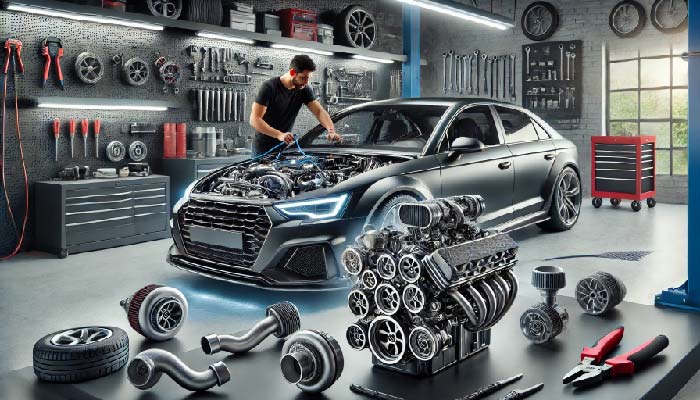
Engine modifications are popular among car enthusiasts who want to enhance performance, increase horsepower, or achieve better fuel efficiency. However, modifying a car engine isn’t just about adding parts or tweaking systems; it’s crucial to understand the legal implications. This article explores the legal aspects of engine modifications, ensuring that your vehicle remains compliant with local regulations.
Why Modify Your Engine?
Car enthusiasts modify their engines for various reasons. Some do it to boost speed and power, while others aim for better fuel economy or unique customization. Whatever the reason, engine modifications can significantly change how a vehicle performs and functions.
Legal Considerations for Engine Modifications
Before making any engine modification, it’s essential to understand the legal regulations that apply in your area. Here are some aspects you need to consider:
1. Emissions Standards Compliance
One of the primary legal concerns for engine modifications is compliance with emissions standards. Governments have set strict regulations on vehicle emissions to control pollution. Modifying an engine might affect the emissions output, leading to possible legal issues if your car exceeds the allowed limits. It’s important to ensure that any changes do not violate environmental standards.
2. Vehicle Inspection and Certification
In many countries, modified vehicles must undergo a vehicle inspection to verify their compliance with road safety and emissions standards. The inspection ensures that the modifications do not make the car unsafe or harmful to the environment. Some regions require certification for specific modifications, and failing to obtain this can lead to fines or penalties.
3. Insurance Implications
When modifying an engine, it’s important to inform your insurance provider. Failing to disclose modifications can lead to insurance policy issues. Some modifications might increase your premium, while others might render your policy void if they are not reported. Always check with your insurance company before making any engine changes.
4. Street Legality of Modified Cars
Not all engine modifications are street-legal. For example, using certain high-performance parts, like nitrous oxide kits, can be illegal on public roads in many places. Modifications that drastically alter a vehicle’s noise level, emissions, or safety systems might also be prohibited. Understanding which modifications are allowed can help you avoid legal troubles.
5. Noise Regulations
Engine modifications that increase vehicle noise can be a legal issue. Different areas have different noise regulations, and exceeding the legal noise limit could lead to fines or other legal actions. Mufflers and exhaust systems are often the focus of these regulations, so make sure your modifications comply.
Popular Engine Modifications and Their Legalities
Here are some common types of engine modifications and their typical legal considerations:
1. Performance Chips and ECU Tuning
These modifications are designed to improve engine performance by altering the engine control unit (ECU) settings. While legal in many areas, ECU tuning must still meet emissions and safety standards. Always check local laws before proceeding.
2. Turbochargers and Superchargers
Installing a turbocharger or supercharger can significantly boost a car’s horsepower. However, these modifications can affect emissions levels, so it’s essential to ensure that they are compliant with local environmental regulations.
3. Cold Air Intakes
Cold air intakes can improve engine performance by allowing more air to enter the engine. While generally legal, there may be restrictions if the modification affects emissions. Make sure to use legal aftermarket parts that comply with local standards.
4. Exhaust System Modifications
Modifying the exhaust system can change the vehicle’s noise and emissions levels. Laws on exhaust modifications vary widely; therefore, it is important to understand the exhaust noise regulations in your area.
5. Nitrous Oxide Systems
Although nitrous oxide can boost engine performance, it is illegal for street use in many places. It is typically allowed only for off-road or race use, and using it on public roads can lead to serious legal consequences.
Tips to Ensure Your Engine Modifications Are Legal
- Research Local Regulations: Always check your local laws regarding car modifications. Different areas have different rules, so it’s important to know what is allowed.
- Use Certified Parts: Purchase parts that meet safety and emissions standards. Certified parts are more likely to be legal.
- Get Inspections Done: Have your modified vehicle inspected to confirm it complies with legal requirements.
- Inform Your Insurance Company: Let your insurance provider know about any changes. This ensures your vehicle remains covered.
- Consult Professionals: Before making modifications, consult a professional who understands both the technical and legal aspects of engine modifications.
Conclusion
Modifying your car’s engine can be exciting, but it’s crucial to consider the legal implications. Understanding the legal aspects of engine modifications will help ensure your vehicle remains safe, compliant, and insurable. Always prioritize safety and legality over performance gains.
FAQs
1. Are all engine modifications illegal? Not all engine modifications are illegal. However, certain modifications might be restricted based on emissions, noise levels, or safety concerns. Always check local regulations before proceeding.
2. Do I need to inform my insurance company about engine modifications? Yes, it is essential to inform your insurance company about any modifications. Failure to do so could invalidate your insurance policy.
3. Can I install a turbocharger on my street car? You can install a turbocharger on a street car, but it must comply with local emissions and safety standards. Consult local regulations before making this modification.
4. What happens if my car fails an emissions test due to modifications? If your car fails an emissions test, you may be required to remove the modifications, pay fines, or face other legal penalties. Ensuring compliance with emissions standards is crucial.
5. Are nitrous oxide systems legal for street use? In many places, nitrous oxide systems are illegal for street use. They are generally permitted only for off-road or racing purposes.
If Like This Article Visit Our Website. Collect From Wekiapedia